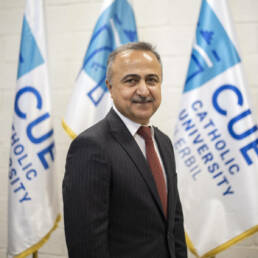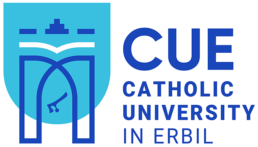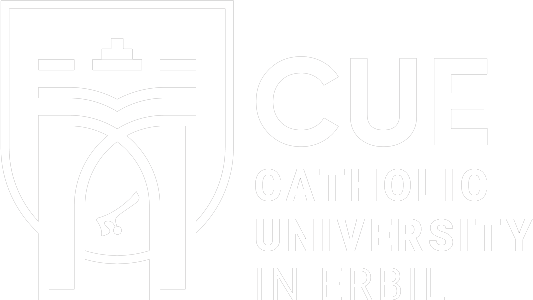About CUE
The Catholic University in Erbil (CUE) is a non-profit institution of higher education and scientific research providing recognized degrees in the arts and sciences.
The Catholic University in Erbil (CUE) welcomes students of all cultures, faiths, and backgrounds to study in an environment of tolerance and academic excellence, promoting quality, individual dignity, and justice.
The Catholic University in Erbil (CUE) is an open academic community, based on the best tradition of higher education, dedicated to forming the next generation of leaders to serve with professional excellence in Kurdistan, Iraq, and internationally, for the common good, and the dignity of the human person.
As a member of the worldwide community of Catholic Universities, CUE will be able to introduce its students to some of the finest scholars in the world who will regularly be present as professors and teachers here on the CUE campus.
CUE students also have the ability to communicate and participate virtually with our partner universities in Australia, the USA, and Europe.
University President's Message
I am pleased to introduce you to the Catholic University in Erbil, an esteemed institution dedicated to providing a comprehensive and enriching educational experience rooted in the principles of Catholic values.
At the Catholic University in Erbil, we strive to foster a nurturing and inclusive learning environment that encourages academic excellence, critical thinking, and a deep sense of community. Our commitment to holistic education extends beyond the classroom, encompassing spiritual, moral, and social development.
Our distinguished faculty members are dedicated to imparting knowledge, guiding students on their academic journey, and instilling a sense of responsibility towards society. With a curriculum that blends academic rigor with ethical principles, we aim to prepare students for the challenges of a rapidly evolving world while nurturing a strong moral compass.
As a Catholic institution, we embrace diversity and welcome students of all backgrounds, fostering an atmosphere of tolerance and understanding. Our campus is equipped with state-of-the-art facilities, creating an ideal setting for intellectual exploration, research, and personal growth.
At Catholic University in Erbil, the profound belief that every story matters serves as the cornerstone of the institution’s ethos. The university is committed to recognizing and valuing the unique narratives that each individual brings to the academic community. Whether through diverse cultural backgrounds, personal experiences, or academic pursuits, every student’s story is seen as integral to the rich tapestry of the university’s identity.
Whether you are a prospective student, faculty member, or community member, we invite you to explore the rich educational opportunities offered at the Catholic University in Erbil.
Join us in our mission to cultivate well-rounded individuals who are not only academically proficient but also compassionate and socially responsible citizens.
Thank you for considering the Catholic University in Erbil as your academic home.
We look forward to the possibility of welcoming you into our community.

The CUE Logo – Explained
- The symbol, in general, is streamlined in dimensions which reflects the streamlined dimensions of the intellect.
- The pyramid shape and two lines on top symbolize the Babylonian design and Mesopotamian culture.
- The letter centering the gate shape refers to the first letter of Chaldean language ALAP (A) that descended from the Mesopotamian languages that first invented writing. Also, the letter ALAP (A) refers to the first letter of Arbil city name.
- The opened book shape in the middle of the pyramid shape dragging downward refers to the knowledge that emerged from the depth of civilization heading to the future.
- The shape of the gate at the bottom symbolizes the Erbil Citadel.


The Catholic University in Erbil (CUE) takes as its mission the formation of future leaders fulfilling society and world needs, the advancement of cohesive communities, and the promotion of peaceful coexistence. CUE’s task is to prepare students academically and culturally through an education that offers both knowledge and values, which uphold and sustain the common good.

Our vision is to empower students to contribute to the advancement of local and global communities through an emphasis on excellence in teaching and research. We strive to make an environment that respects and values human dignity, forming future leaders who promote peace and justice.
Philosophy and Values
The CUE is a non-profit higher education and scientific research institution. It welcomes students from all cultures, religions, and educational backgrounds in an environment of tolerance and academic excellence. It stresses quality teaching and learning, peace, and justice.
It represents an open academic community based on the best higher education standards. It is dedicated to preparing the coming generation of professional leaders to work with competence and excellence in KR, Iraq and the world at large for the common good and human dignity.
Excellence
In teaching, research, scholarship, creative endeavors, student services and in all aspects of the University’s operations is continuously pursued at the University to ensure institutional effectiveness and efficiency.
Dedication
Reflected in our distinctive work ethic and in our commitment to excellence
Inclusion
Reflected in a culture and climate that seeks, welcomes and advances talented minds from diverse backgrounds
Integrity
Honest communications, ethical behavior and accountability for words and deeds are expected from all members of the University community.
Collaboration
Reflected in our interdisciplinary approach, our focus on internal and external partnerships and our capacity to create new fields of inquiry
Life-Long Learning
Encouraging enthusiastic, independent thinkers and learners striving for personal growth.
Leadership
Seeks to provide rigorous academic curricula and challenging co-curricular opportunities to promote the development of leadership qualities in students and to facilitate leadership development among faculty, staff and students.
Sustainability
Reflected in our shared commitment to lead by example in preserving and protecting our natural resources and in our approach to responsible financial planning.


